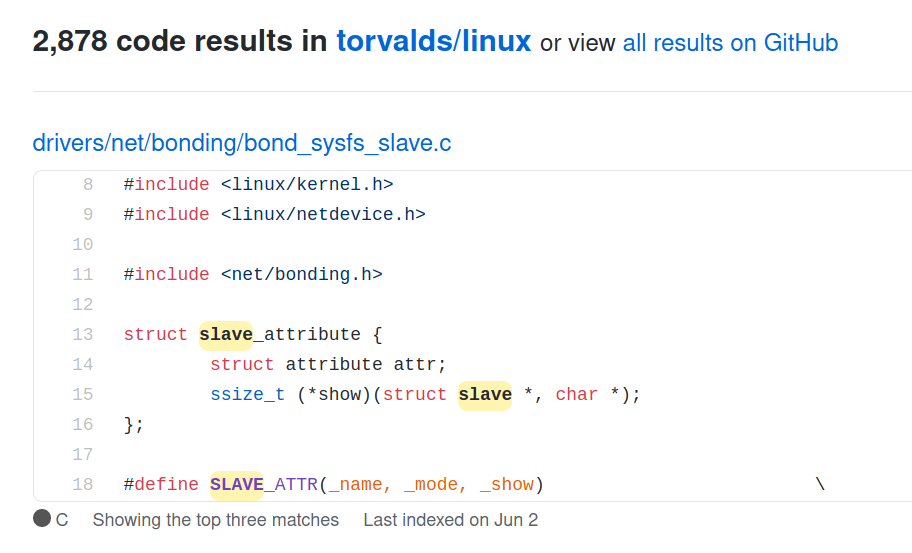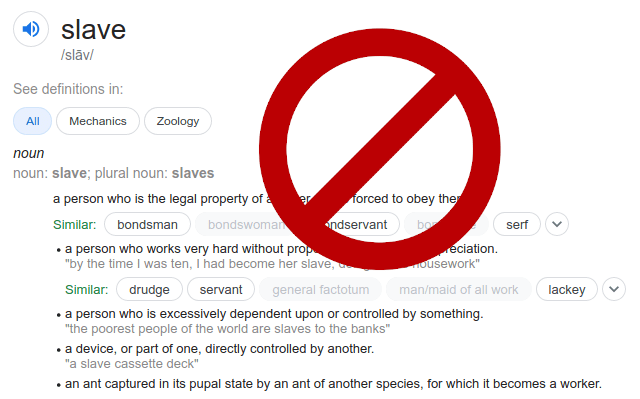2020 has been an interesting year with plenty of disruption to most people lives, and political changes. Now it appears some of those changes will affect technology, and by that, I mean things like changes to datasheets and even source code.
I’ve been seen a lot of talks about slave/master terminology on Twitter, blogs, and CNET is now reporting Twitter Engineer will remove racially charged technical terms from the source code and interface.
Whether you are a veteran or just graduated last year, you may have to learn a new set of vocabulary to understand datasheets and code.
| Old Vocabulary | New Vocabulary |
|---|---|
| Whitelist | Allowlist |
| Blacklist | Denylist |
| Master/slave | Leader/Follower, Primary/Replica or Primary/Standby |
| Grandfathered | Legacy status |
| Guys | Folks, People, You all, Y'all. |
| Gendered pronouns like He / His | They or Their. |
| Man hours | Hours or Engineer Hours |
| Sanity check | Quick Check, Confidence Check or Coherence Check |
| Dummy value | Placeholder value or Sample value |
Twitter’s senior management is allegedly backing the effort for the changes. This goes beyond racially charged terms, but if it’s the world we’re going to live in so be it. Some changes in the datasheet may not be a big issue, except for the initial confusion, but it may become problematic when changes happen in the source code as it may break other programs and scripts.
One example is Github planning to replace the master branch by another name. If it’s going to happen, and others are going to follow suit, I wondered about many “slave” code results there are in the Linux kernel. Answer: 2,878.


Jean-Luc started CNX Software in 2010 as a part-time endeavor, before quitting his job as a software engineering manager, and starting to write daily news, and reviews full time later in 2011.
Support CNX Software! Donate via cryptocurrencies, become a Patron on Patreon, or purchase goods on Amazon or Aliexpress






Don’t get me wrong but all this is so hypocritic. I mean sure, let’s change the words, I agree; but this won’t change the reality. It feels like some people focus on things that bring no real value and they feel nice because they think they did their part. Well, they didn’t. Change master/slave terminology doesn’t change the fact that there are still masters and slaves in 2020 and there will be for many years to come. I would expect a more substantial reaction on that matter, especially from companies that shout out loud how proud they are, because… Read more »
These are the dynamics at work here, the professed subject is pretty much irrelevant:
http://abandonedfootnotes.blogspot.com/2012/10/ten-thousand-melodies-cannot-express.html
Hard to say why you’re downvoted.
You’ve linked a very interesting piece on social dynamics in certain conditions.
The unique thing in there I haven’t met anywhere else is mentioning “those “wielding the power of interpretation”” as a separate cohort.
Indeed, there’s no need to make rules logically consistent as long as the power of interpretation is sure to stay in the right hands.
The dynamics that made Mao worship sectarian are also very interesting.
When a lot of people try to be ahead of the curve even in following the party line, that leads to divergence.
“Master/slave -> Leader/Follower, Primary/Replica or Primary/Standby”
Larry Garfield could not be reached for comment.
The funny part is in many other languages those terms are much less weitd, but we took them over in the recent years with the continuing anglification of terminology. Just one example from outside IT.
In my mother tongue there is the term parents bedroom, now to be hip you call it a master bedroom.
We can scrub the language but we can never overcome stupidity it seems.
Why not Primary/Secondary
Why not let the perpetually offended fork the code? Assuming they know how.
In watchmaker terms they spoke about a daughter clockwork, maybe we could make it parent/child but that would enslave children…
I won’t even apologize or write “don’t get me wrong” in advance, as it would only add to hypocrisy we are witnessing. Outlawing words and inventing new ones isn’t new thing, it was done by all kind of leftist revolutionaries during, for example, French and Russian revolutions. And it never ended up quite well. If you are offended by something – walk away, don’t look at it, in this case – fork it and create your own safe and politically correct code. Spend YOUR resources on “cleaning” it up. Don’t demand someone to spend their.
>walk away, don’t look at it, in this case – fork it and create your
>own safe and politically correct code.
Too late for that. I’d guess that the people wanting to revise history are the minority.. the problem is that minority bullied the vast majority of big projects into having Code of Conducts which basically outlaw having a spine.
I’m pro freedom for all. And surely against slavery. But no person ever got hurt by programmers using the word slave and master in another context then slavery. But with these words I’d accept it to replace with primary and secondary. I already used those terms. But words as dummy, man hours, sanity check??? What are they thinking? Problem I see with banning words, is people will do witch hunts towards anyone using these words. It’s the one putting another meaning out of context who are wrong. Look at other things to improve. Do something for equality in life. … Read more »
What are you talking about? White males created IT… and trained their replacements. A recent study in New Jersey found that only 1 in 7 IT developers are white. ONE IN SEVEN… is that what you call “white domination”? Some even call it supremacy. The situation is similar around the corpo-landscape, I can’ t think of a company with ratio higher than 1 in 3. How weak one has to be to feel dominated by people 7 times less in number?
I wonder how many people complaining about these terms are doing it from a mac book built by modern slaves.. oh the irony.
Pathetic does not begin to describe this move and it will open the floodgates for anybody to be offended by something and come up with some kind of tenuous link. Twitter backs this but will they remove the name Noah Glass from their books because it might offend atheists? I hope that more calm headed and normal people will continue to use these phrases because they are far from racially charged. And why, of such a move was even considered reasonable, would the focus only be on race, which rather proves that this is nothing more than… Read more »
Over the last couple of years Ive put on a little weight and would be considered overweight now and Ive become rather sensitive about it. So could we stop using the word fat? Seeing that word now makes me uncomfortable. Like fat32, could we change it to something like wide32? I understand that in the context its being used it doesnt relate to a persons weight but means File Allocation Table but it still reminds me Im overweight so I would like something done about it. Thank you. hehe, change the words if it will make some people happy,… Read more »
bodypositive32 it is, then
Yesterday I read a newspaper article where absolutely consequently the male and female forms were both used in every possible way and then even separated by colons. You can imagine reading flow was gone completely. And speaking about equality if you flange the female ending behind a word, it cripples the male form. So in fact to celebrate equality they should add another colon to append the missing male ending. 😉
What’s the ‘new vocabulary’ for ‘gender bender’ ? Asking for a friend.
Genderfluid or genderqueer, maybe.
Those sound like adjectives, I’m looking for a noun.
There are more masters than slaves: root@xu4-buster:/home/pi/linux# find . -type f -name *.c -exec cat {} + | grep master | wc -l 22238 root@xu4-buster:/home/pi/linux# find . -type f -name *.h -exec cat {} + | grep master | wc -l 2186 root@xu4-buster:/home/pi/linux# find . -type f -name *.c -exec cat {} + | grep slave | wc -l 16168 root@xu4-buster:/home/pi/linux# find . -type f -name *.h -exec cat {} + | grep slave | wc -l 1627 root@xu4-buster:/home/pi/linux# 123456789 root@xu4-buster:/home/pi/linux# find . -type f -name *.c -exec cat {} + | grep master | wc -l22238root@xu4-buster:/home/pi/linux#… Read more »
This progressive political correctness is designed to divide and conquer us. Those that fall into this trap are weak and pathetic. They have become the new slaves on bent knee before their fascist dictators. Do not fall victim to this scourge. Stand strong, eye-to-eye with evil, and defend yourself.
I don’t think the reasonable response is defense, rather ridicule.
Ridicule is a form of defense, you can think both, no problem.
It’s happening in Linux: Recent events have prompted a Linux position statement on inclusiveterminology. Given that Linux maintains a coding-style and its ownidiomatic set of terminology here is a proposal to answer the call toreplace non-inclusive terminology.…+For symbol names, avoid introducing new usage of the words ‘slave’ and+’blacklist’. Recommended replacements for ‘slave’ are: ‘secondary’,+’subordinate’, ‘replica’, ‘responder’, ‘follower’, ‘proxy’, or+’performer’. Recommended replacements for blacklist are: ‘blocklist’ or+’denylist’.++Exceptions for introducing new usage is to maintain a userspace ABI, or+when updating code for an existing (as of 2020) hardware or protocol+specification that mandates those terms. For new specifications consider+translating specification usage of… Read more »
Changing words only will not really change things and actually may even make things worse.
One of the cases I personally encountered was a company where developers were called “resources”. I really felt on par with a soldering iron there.
Being a resource suggested I was easily replacable.
Welp, my knowledge of old Soviet political jokes slowly becomes relevant again.
Here’s one:
“1) Don’t think.
2) If you think, don’t talk.
3) If you think and talk, don’t write.
4) If you think, talk and write, don’t sign.
5) If you think, talk, write and sign, don’t wonder.”